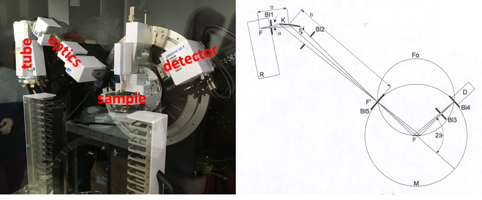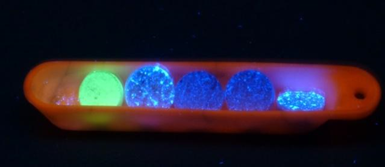ECTS
120 credits
Duration
2 years
Training structure
Faculty of Science
Language(s) of instruction
French
Presentation
The "Materials Chemistry" program offers training that allows students to specialize or acquire new skills in the fields of materials chemistry and its interfaces for research or in industrial sectors related to sustainable development, energy, health, and the environment. The program introduces students to the concepts and tools used in the design and development of various types of materials, their characterization, and applications in the above-mentioned fields. The training received allows students to integrate both academic and industrial research.
M1: 93% and M2: 95%
Success rate
Objectives
Graduates are trained for careers in industry and research related to materials and process chemistry in the fields of sustainable development, health, and the environment. The Materials Chemistry program offers a wide range of courses over two years, with a progressive and chronological acquisition of knowledge, including inorganic chemistry, coordination chemistry, polymer chemistry, materials, and nanomaterials, providing a high-level, multidisciplinary specialized education. Courses will be taught by experts in the field (fundamental and applied) of chemistry and materials in order to provide an understanding of fundamental principles and experimental concepts and to acquire scientific and technical knowledge, working methods, and communication tools. The program also aims to provide cutting-edge practical experience through a wide variety of customized study projects.
To personalize your expertise, you can choose between the following two specializations:
- Materials for sustainable development and the environment
This specialization places particular emphasis on the study of materials used in activities that respond to societal demand and current environmental constraints: energy storage, conversion, and clean production; environmental control and pollution control; green chemical production: materials derived from renewable resources. Students will thus acquire the knowledge they need to develop materials that are as respectful as possible of people and the environment, thanks to a sustainable chemistry approach.
- (Nano)materials for health
This specialization allows students to specialize in the field of health with the development, design, and characterization of inorganic, organic, and biological materials and nanomaterials, as well as the study of their properties and uses, including implants, contrast agents for various types of imaging, and therapeutic agents for various pathologies. Students will acquire knowledge of issues in the health sector, giving them a comprehensive overview of materials currently on the market and in development, as well as learning about the tools for innovation and design of new (nano)materials and the prerequisites for their applications.
Know-how and skills
Upon completion of this program, graduates will have acquired the scientific and technical skills enabling them to:
- have a solid understanding of the essential concepts, theories, and experimental methods of research and development on materials and nanomaterials;
- to understand the different types of materials and nanomaterials and be able to apply and adapt theories and experimental methods to new problems in the three fields (sustainable development, health, and membranes) and critically evaluate the work of other scientists;
- to be able to communicate information in the three areas (sustainable development, health, and membranes) to expert colleagues and the general public.
Graduates will also gain an in-depth understanding of:
- modern methods for synthesizing and characterizing materials (inorganic, polymer, or hybrid) from the nanoscale to the macroscale;
- the modification, structure, and properties of materials and nanomaterials (inorganic, polymeric, hybrid);
- industrial applications of research on materials and nanomaterials;
- prerequisites for applying these materials and nanomaterials in the fields of sustainable development, health, and membranes.
Depending on the specialization, more specific skills will be acquired.
Specific objectives for the Materials for Sustainable Development and the Environment specialization:
- Acquire solid knowledge of the development, characterization, and application of organic and inorganic materials.
- Design, synthesize, and characterize materials for the development of products with specific properties that can be used in the fields of the environment, energy storage, and energy conversion.
- Design, develop, and characterize new materials and nanomaterials with a view to developing products with defined properties.
- Acquire new skills to design and synthesize materials in a clean and sustainable manner.
- Have a general understanding of issues in the field of sustainable development: eco-design, life cycle analysis.
Specific objectives for the specialty of (nano)materials for health:
- Have an understanding of health-related issues and the prerequisites for (nano)materials in this field.
- Design, develop, and characterize new materials and nanomaterials for healthcare (implants, contrast agents for imaging, therapeutic agents, theragnostics, etc.).
- Innovate by proposing ways to improve performance (e.g., improved physical, mechanical, and pharmacokinetic properties, reduced toxicity, addition of another functionality) leading to the development of new materials and (nano)materials for healthcare applications.
- Be able to propose new functional and multifunctional complex materials and nanomaterials applicable in the field of health.
Organization
Internships, supervised projects
Internship | Mandatory |
|---|
M1 – Semester 1: Professional Projects – Project Monitoring (8 ECTS)
M1 – Semester 2: Communication and Professional Integration (2 ECTS)
M1 – Semester 2: 2- to 4-month internship in a laboratory or company, preceded by a bibliographic report (10 ECTS)
M2 – Semester 3: Project Management – Business Law – Innovation and Intellectual Property (4 ECTS)
M2 – Semester 3: Thematic study
M2 – Semester 4: 5- to 6-month internship in a laboratory or company (28 ECTS)
Program
The program is divided into four semesters, each worth 30 ECTS credits, in accordance with the European system. Assessment is carried out for each teaching unit (UE) in the form of either a final written exam, continuous assessment, or a written assignment and oral presentation for internship UEs. In each semester, teaching units can be compensated for, and an average of 10/20 or higher for the entire semester is required for validation. Semesters cannot be compensated for between each other.
Select a program
M1 - Materials Chemistry (MAT P1)
Thermodynamics and phase equilibria
2 creditsOPTION 1
4 creditsChoose 2 out of 3
Supplements in solution chemistry
2 creditsCrystallography I
2 creditsAnalysis of biomolecules by mass spectrometry
2 credits
Polymers
2 creditsAdvanced inorganic materials
2 creditsSolutions, colloids, interfaces
2 creditsLiquid NMR spectroscopy and X-ray diffraction
2 creditsChemometrics, statistical data analysis, experimental design
2 creditsOrganometallic chemistry and heteroelement chemistry
2 creditsMethodology for characterizing materials
2 creditsCoordination chemistry and organic chemistry
2 creditsProfessional projects – project monitoring
8 credits
2-4 month M1 internship with thesis defense/report in English
10 creditsOPTION 2
4 creditsChoose 2 out of 4
Fundamentals of Process Engineering
2 creditsBio-based chemistry
2 creditsLiquid-liquid extraction: kinetics and thermodynamics
2 creditsMedicinal chemistry
2 credits
Innovative synthesis and extraction processes
2 creditsThermal and mechanical properties of materials
3 credits20hIntroduction to modeling
2 creditsNanomaterials
2 creditsCommunication and professional integration
2 creditsElectronic and optical properties
2 creditsHybrid and structured materials
2 creditsDistributed systems
2 credits
M2 - Materials Chemistry (MAT P1)
Admission
Admission requirements
Applications can be submitted on the following platforms:
- French and European students: follow the "Mon Master" procedure on the website:https://www.monmaster.gouv.fr/
- For M2 students, applicants must submit their application via the e-candidat application on the website of the Faculty of Sciences at the University of Montpellier:
- International students from outside the EU: follow the "Études en France" procedure:https://pastel.diplomatie.gouv.fr/etudesenfrance/dyn/public/authentification/login.html
Target audience
Admission to M1: selection based on application. Holder of a bachelor's degree (L3) in chemistry, physical chemistry, or equivalent. Validation of prior learning by a jury for other scientific bachelor's degrees.
Admission to M2: selection based on application. Holder of a Master's 1 degree in chemistry, physical chemistry, or equivalent. Validation of prior learning by a jury for other scientific master's degrees.
Capacity
35 in M1 and M2
Mandatory prerequisites
Skills in chemistry or physical chemistry.
Recommended prerequisites
Skills in solution chemistry and materials chemistry.
Fluency in French and English is an additional asset.
And after
Continuing education
Doctoral thesis or another master's degree for the acquisition of dual skills.
Continuing studies abroad
Doctoral thesis or other master's degree.
Gateways and reorientation
Bridge programs: admission based on application for Master's 2 for candidates with a Master's 1 in chemistry or equivalent training.
Reorientation: reorientation possible at the end of the Master 1 year.
Professional integration
Business sectors:
Graduates can work in a variety of companies and sectors involved in the design, synthesis, and development of materials and nanomaterials used in the fields of sustainable development, health, the environment, and energy. They can work as executives in all research activities in large companies, SMEs, or public research organizations.
He may also undertake research assignments (fixed-term contracts, thesis contracts, etc.) in public or private laboratories.
In addition, he may also pursue a career in secondary education at a private school.
Types of jobs available:
- Chemical engineer, materials chemist, or process chemist responsible for production, analysis, quality control, or project management.
- R&D engineer in a design office or in the chemical, pharmaceutical, healthcare, recycling, environmental, medical device, contrast agent industries, etc.
- Researcher/R&D or research engineer (after completing a PhD, which this program prepares students for): conducting scientific studies and implementing technological projects




